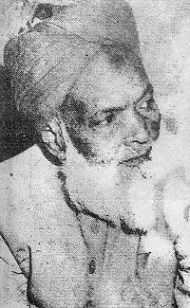Muhammad Shafi | |
|---|---|
مفتی محمد شفیع | |
 | |
| 1st President of Darul Uloom Karachi | |
| In office 1951 – 6 October 1976 | |
| Preceded by | Position established |
| Succeeded by | Abdul Hai Arifi |
| 4th Chief Mufti of Darul Uloom Deoband | |
| In office c. 13 August 1931 – c. November 1935 | |
| Preceded by | Riyazudin Bijnori |
| Succeeded by | Muhammad Sahool Bhagalpuri |
| 7th Chief Mufti of Darul Uloom Deoband | |
| In office c. 4 April 1940 – c. 23 March 1943 | |
| Preceded by | Kifayatullah Gangohi |
| Succeeded by | Farooq Ahmad |
| Personal | |
| Born | c. 25 January 1897 |
| Died | 6 October 1976 (aged 79) Karachi, Sindh, Pakistan |
| Religion | Islam |
| Nationality |
|
| Era | 20th-century philosophy |
| Denomination | Sunni |
| Jurisprudence | Hanafi |
| Creed | Maturidi |
| Movement | Deobandi |
| Main interest(s) | Tafsir |
| Notable work(s) | Ma'ariful Qur'an, Seerat Khatam al-Anbiya |
| Alma mater | Darul Uloom Deoband |
| Tariqa | Chishti (Sabiri-Imdadi) |
| Muslim leader | |
| Disciple of | Ashraf Ali Thanawi Mahmud Hasan |
Students | |
Influenced | |
| Part of a series on the |
| Deobandi movement |
|---|
 |
| Ideology and influences |
| Founders and key figures |
|
| Notable institutions |
| Centres (markaz) of Tablighi Jamaat |
| Associated organizations |
Muḥammad Shafī‘ ibn Muḥammad Yāsīn ‘Us̱mānī Deobandī (Urdu: محمد شفیع بن محمد ياسین عثمانی دیوبندی; Arabic: محمد شفيع بن محمد ياسين العثماني الديوبندي, Muḥammad Shafī‘ ibn Muḥammad Yāsīn al-‘Uthmānī ad-Diyūbandī; c. 25 January 1897 – 6 October 1976),[note 1] often referred to as Mufti Muhammad Shafi, was a Pakistani Sunni Islamic scholar of the Deobandi school of Islamic thought.
A Hanafi jurist and mufti, he was also an authority on shari'ah, hadith, Qur'anic exegesis, and Sufism. Born in Deoband, British India, he graduated in 1917 from Darul Uloom Deoband, where he later taught hadith and held the post of Chief Mufti. He resigned from the school in 1943 to devote his time to the Pakistan Movement. After the independence he moved to Pakistan, where he established Darul Uloom Karachi in 1951. Of his written works, his best-known is Ma'ariful Qur'an, a commentary on the Qur'an.
Cite error: There are <ref group=note> tags on this page, but the references will not show without a {{reflist|group=note}} template (see the help page).
